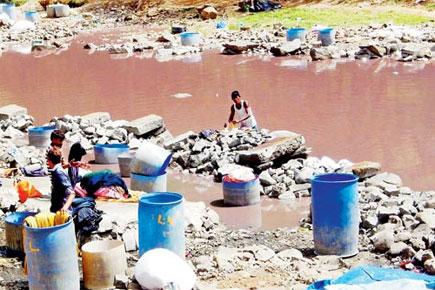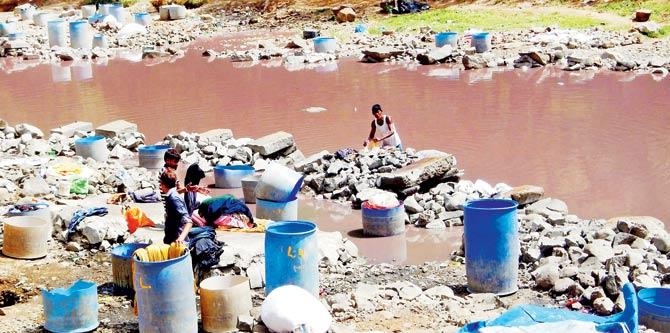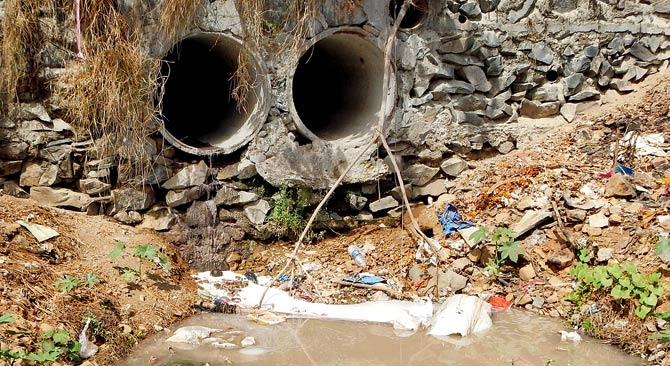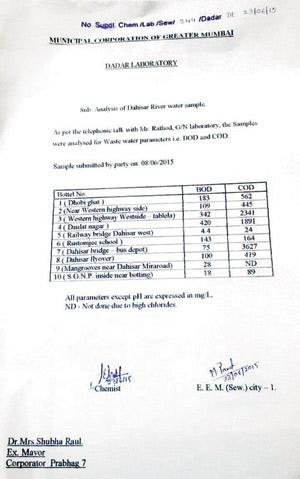Two months after the mid-day exposé on how hospital uniforms were being washed in contaminated water of reservoir on Dahisar River, a report also reveals the presence of the dangerous E. coli bacteria

Two months after the mid-day exposé that clothes from various restaurants, homes, and even hospitals from the western suburbs and Colaba were being washed in sewage water contaminated with toxic chemicals and human and animal faeces, a water analysis report has confirmed the worst fears of everyone involved.
Also read: Hospital uniforms being washed in sewer water!
ADVERTISEMENT
Stating that the water from the reservoir behind the Sanjay Gandhi National Park, where mid-day had spotted the clothes being washed, is essentially 90% sewage water contaminated with faeces, the reports indicate the presence of E. coli, which can lead to potentially fatal kidney failure, especially among the very young, the elderly, and patients in hospitals, whose linen was being washed there.

mid-day had reported (top) in April about the reservoir filled with filthy water from BMC sewage lines, which is part of the Dahisar River and is also called Dhobi Ghat. File pic
The reports state that samples also had nitrites — commonly found in fertilisers — which can cause shortness of breath, especially in infants and those with low immunity, and could also prove deadly.
So bad are the samples, in fact, that former mayor Dr Shubha Raul, who collected them and got them analysed, said that the water body itself should be in an ICU.

Shit happens: Sewage water also empties into the Dhobi Ghat, which is allegedly still being used to wash linen. File pic
The worst part? Activists said that while the volume of clothes being washed at the dhobi ghat had decreased after this paper’s report, it’s nearly business as usual there again.
Reservoir of disease
Barely 20 feet long and filled with filthy, stagnant water from BMC sewage lines, the reservoir, which is part of the Dahisar River and is also called Dhobi Ghat, was serving as an open-air laundry and over 4,000 clothes were being washed there every day, including linen from hospitals and restaurants not only in and around Borivli, Kandivli and Dahisar, but also from places as far as Colaba. The stagnant water in the reservoir begins flowing in the monsoon.
After mid-day’ sreport on April 8, Dr Raul, who is a corporator and former mayor, took the initiative to collect ten water samples from the Dhobi Ghat and other parts of the Dahisar River. The samples were tested in the BMC laboratory in Dadar and, after the reports came out a few days ago, she told this paper that it was truly alarming that linen washed in such highly contaminated water was being used in households, hospitals and restaurants.

One of the reports from BMC's laboratory in Dahisar
“This is probably the first time that such a detailed water analysis has been conducted in Mumbai and the results clearly show that the water body ought to be in an ICU and that urgent remedial action is required. The huge amount of organic waste results in the presence of E. coli, a bacterium that is commonly found in the gut of warm-blooded organisms and can infect young children, elderly individuals and patients with weakened immune systems. They can develop potentially fatal haemolytic uremic syndrome (HUS), a type of kidney failure,” said Dr Raul.
She added that nitrites, commonly used in fertilisers, which have been detected in some of the water samples, can infect infants under the age of six months, as well as patients with low immunity, who could become seriously ill and could even die if they didn’t get treatment. “Symptoms include shortness of breath and blue baby syndrome,” she said.
Crossing all limits
Dr Anjana Pant, an environmentalist who has been working in the field of remediation of heavy metals in aquatic bodies using organic methods for over 20 years, said that the BMC lab report states the water from Dhobi Ghat has a Biochemical Oxygen Demand (BOD) — which indicates the presence of a high level of harmful micro-organisms — of 183, which is over six times the permissible limit. Similarly, the COD or Chemical Oxygen Demand, which is measurement of all chemicals (organic and in-organic) in the water was 562, which is over twice the allowed limit.
“The inorganic chemicals found in Dhobi Ghat are mainly from detergents, cleansers, and bleaches, in addition to some industrial waste and sewage. Sewage from nearby households enters through small drains and flows into the river, too, increasing the chances of the presence of faecal coliform, a bacterium which originates from human faeces and other warm-blooded animals. This could be extremely hazardous, as hospital and restaurant linen are washed there,” she said.
However, Dr Pant, who is also a consultant for reviving the Dahisar River, stressed on the need for further analysis to rule out any discrepancies. “Just before the river flows into the mangrove area, near Dahisar-Mira Road, the BOD was 28, which is surprisingly within the permissible limits, and COD was undetected. But chloride seems to be excessive at 1,956 mg/l, while the source of the river, near SNGP, records it at 48 mg/l. The reason for this massive increase needs to be detected and rectified,” she said.
 Subscribe today by clicking the link and stay updated with the latest news!" Click here!
Subscribe today by clicking the link and stay updated with the latest news!" Click here!







